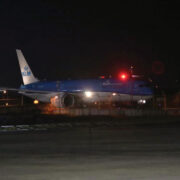
THE Philippines received on Thursday, March 4 the first shipment of 487,200 COVID-19 vaccines developed by British-Swede drugmaker AstraZeneca.
According Philippine vaccine czar Carlito Galvez Jr., the decrease in the 525,600 doses that the Palace initially gave was because of cargo limitations, as the vaccines will be delivered using a commercial flight.
“This is a commercial airline, may mga pasahero po ito, so may mga restrictions po tayo sa mga packages. Considering that it is commercial, so nagkaroon po sigurong limitations in terms of ‘yung sa cargo (This is a commercial airline, which has passengers, so there are restrictions for the packages. Considering that it is commercial, that’s probably why we had limitations in terms of the cargo),” he explained.
The COVID-19 jabs from AstraZeneca are under the COVAX facility.
Backed by the World Health Organization (WHO) as well as the vaccine alliance Gavi and the Coalition for Epidemic Preparedness Innovations, the COVAX facility is a global platform that aims to ensure fair and equitable access to COVID-19 vaccines for all countries.
The Philippines is set to receive at least 5.6 million COVID-19 vaccine doses from Pfizer-BioNTech and AstraZeneca through the facility.
In January, Galvez said the country will be provided with 117,000 doses of the Pfizer-BioNTech vaccine and 5,500,800 to 9,290,400 doses of the AstraZeneca vaccine.
Presidential Spokesperson Harry Roque said President Rodrigo Duterte will personally welcome the arrival of the British-made vaccines to express his gratitude to the WHO and British Ambassador to the Philippines Daniel Pruce.
“He will return to Manila if he’s in Davao and he will welcome the arrival of AstraZeneca because it’s important to also thank WHO and the British government since the arrival of AstraZeneca vaccines from the COVAX facility was because of Ambassador Pruce’s intercession,” he said in Filipino on Tuesday, March 2.
AstraZeneca jabs eyed for elderly health workers
The AstraZeneca vaccines arriving in the Philippines may be allocated for senior healthcare workers since Sinovac Biotech’s “CoronaVac” vaccine was not recommended for those over 59 years old.
“May mga doctor po na nagsasabi, priority natin yung mga senior healthcare workers. So yung deployment po nito, sa mga hospital pa rin po (Some doctors are saying that we have to prioritize senior healthcare workers. So its deployment will still be in hospitals),” said Galvez.
“Ang recommendation po nila, considering na may limitations tayo ng 18-59 po na age group ang ating Sinovac (Their recommendation was, considering that we have limitations of [the] 18-59 age group for Sinovac), we want to accept those limitations by having this AstraZeneca available to our senior citizens,” he added.
However, Galvez noted that this move would still be reviewed by members of the National Immunization Technical Advisory Group (NITAG).
“‘Yun po ang tinitignan po namin na anggulo para at least well protected po yung vulnerable, senior healthcare workers (This is the angle we’re looking at to protect our vulnerable, senior healthcare workers),” he said.
The Philippines on Monday, March 1, kicked-off its vaccination drive against COVID-19.
The first dose of CoronaVac was administered to University of the Philippines-Philippine General Hospital Director Gerardo Legaspi, making him the first person in the country to officially receive the COVID-19 jab.
To date, 8,559 individuals have already been vaccinated, according to Cabinet Secretary Karlo Nograles.
Inoculations are already ongoing in 32 hospitals, and will further be expanding to Davao, Cagayan de Oro, and Cebu City as more than 190,000 doses of CoronaVac have been transported nationwide.
The Philippines is aiming to vaccinate 50 to 70 million Filipinos in 2021, with up to 200,000 individuals receiving jabs every day.





